#why are you writing this bullshit
Text
Brendon urie did NOT fucking put the line " makes me want to sl!t my wr!$t " in a fucking song ????
#tw sh#sh mention#tw sh mention#sh tw#oh my god /neg#what in the fuck#brendon urie#tw brendon urie#hes fucking gross i hate him god#i cant believe 14 year old me supported this fucking guy#hes literally so fucked in the head#he actually did that#ew#gross#im so fucking disgusted#brendon urie u need to stop#please stop while u can#you are 35 years old#why are you writing this bullshit#take a SEAT#oh and take this: L
2 notes
·
View notes
Text
DCxDP Fic where the Batfam gets an item/ability which allows them for just that day, to temporarily be able to what someone best accomplishment(s) were in their lives. Little do they know Danny has just settled into their city (and that they were about to get the shock of their lives)
---
At first the Batfam decides to have fun with it--theres not much titles can do to help them with cases unless theyre particularly lucky. So they take a walk together in disguises to observe the passerbyers, curious of what civillains of gotham have done in their lives.
One gruff guy who grumbles shoving Bruce's shoulder as he walks by has the title 'KITTY SAVIOR' adorned above him and the batfam are greeted by the knowledge he had saved a cat from getting hit by a car
A kid in his pteens whose been shoving pamphlets into peoples hands has 'ADVERTISEMENT SUPERSTAR' above his head as he apparently managed to save his family's resturant with his intense marketing prowess (remind Bruce to try hiring him in the future.)
And lastly they faux browse a store trying to scope out someone else interesting and are greeted by the title... 'OPENER OF PICKLE JAR' and they decide to head home as Jason nearly crying trying to muffle his laughter.
At the manor they all cant help but agree, walking has made them hungry, and theres no harm ordering a pizza or two. It's been a long, mildly interesting day, though they weren't expecting much from thing ability.
Imagine their surprise when they open the door to see a black haired blue eyed child, pizza boxes in one hand, the other hand out awaiting a drop of money–completely missing the fact the title 'DEFEATED THE MAD KING WHO HAS TORMENTED THE AFTERLIFE FOR EONS' was placed innocently above his head
"Your total is 23.11!" The fucking 'Ghost King' kid (APPARENTLY) cheerily states????
"Uh," Bruce says blankly staring at this kid's title as his mouth blurts out, "Could you give us a second?"
#Danny: pizza delivery :D!#Batfam: oh hey WHAT THE--#dannys so confused why the waynes are going insane looking at him#but its been a long work day so he lets it slide#bruce: do you take tips in adoption papers--its easier than writing a check#guess whos back on their bullshit#its me#hi party people#dc x dp#dp x dc#dcxdp#dc x dp prompt#dp x dc prompt#dc x dp crossover#batfam#danny fenton#jason todd#ghost king danny#danny's literally jus chillin#bruce wayne#dc x dp fanfiction#fanfiction#feel free to use/add on/write if any of yall like it#get some rest guys#gn :P#veerliwrites
1K notes
·
View notes
Note
what's the threshold theory
There was a post about how Tom is the only crew member who isn't really affected by the Borg, and there's a theory that he has so much luck because he saw the past and the future when he crossed the transwarp threshold. He saw the past and the future, all of time and space. There's some subconscious part of him that remembers that experience. In fact, Tom refused to play a part in Chakotay indulging Annorax's temporal incursions, probably because a part of him knew nothing good could come of it.
If we extend that same theory to Janeway, some of her wild luck with time travel and other crack plans starts to make sense. She doesn't verbally hate time travel until after the events of Threshold, since it happens in Time and Again without complaint. Janeway has an uncanny knack for time travel, as evidenced every time she deals with it. She hates time travel, but it might be because part of her knows exactly how to manipulate the timeline. She manages to avoid the "inevitable" temporal explosion in Future's End, saving both Voyager and Braxton. She resets the entire timeline in Year of Hell, and no one else followed her reasoning. She pulled it off flawlessly. In Relativity, she senses the incidents are all related, despite it being just one reading that connects them. By the time she's involved, she has a temporal incursion factor of .0036 and a time travel protocol named after her, even if that may just be Braxton's personal grudge. Then there's Endgame, where she intentionally changes the timeline. Up until this point, she has been dragged into time travel, but for the first time, she jumps in on purpose. How does Admiral Janeway know how to get them home sooner in a way that completely avoids the Temporal Integrity Commission? It's because she has seen all of time, and part of her knows exactly what needs to happen so she can get Voyager home and do it in a way that becomes baked into the prime timeline. Maybe she doesn't consciously remember what happened during her transformation, but the experience lives in her mind somewhere, guiding her decisions.
#every day is threshold day#tldr threshold cemented the time travel shenanigans#we're not counting her disparagement of time travel in relativity i know it's technically before threshold#but they've messed with the timeline so much that her past timeline is also changed.#Time travel is funny because the past is the future the future is the past#so while relativity comes before threshold in the prime timeline her timeline has also been changed in a way that it wasn't before threshol#we could chalk it up to a writing oversight but this is more interesting#not to mention her uncanny luck with the Borg which I think ties in as well#it's part of why her instinct is so strong#also the bio neural gel packs but that's a different theory#listen she's amazing with or without having seen all of time and space but she has seen all of time and that must have affected her somehow#those little salamander babies also have all of the cosmos in their mind#tried to explain as concisely as possible but it is part of my overarching theory#she doesn't second guess herself nearly as much following their jaunt into transwarp#I have more but I'm trying to be brief cause it's written up partially in my drafts somewhere and i have some things i need to do today lol#meta#Star Trek voyager#Kathryn janeway#threshold day#did you expect me thresholdbb to not have a serious threshold theory?#listen I can make anything nonsense and turn anything into a serious theory I was known for this kinda bs in grad school#I wrote a 25 page paper on NOTHING once#I wrote a paper about how corn fields were super gay and it made my professor cry I can spin the bullshit it is one of my skills
484 notes
·
View notes
Text
listen im ace and im pro kink at pride and whatever, but the way some of yall are wording your posts in response to the backlash against it is uh. really taking me back to the ace shitcourse era.
yall know theres nothing wrong with being a "virgin", right? that its not inherently shameful to have not had sex, to never have sex, even if youre not ace, even if you do want to have sex someday, like, its fine that you haven't had sex?
maybe if your problem is that theyre trying to police your behavior and shame you for expressing your sexuality, you can say that? instead of resorting to "haha stupid virgin gets no bitches" like my god. do you not hear how fucking regressive that attitude is? i know, i know, youre "joking".
get a better joke
#toy txt post#god im going to regret this post im gonna regret it so much i can feel it in my bones#let it flop..........pls#internalize my message let it sink in and understand what i am saying and then let the post flop#i say. knowing the ppl who need to see such a message are the ones who will make me regret this post and regrwt not having#1 million bajillion disclaimers#virgin is in quotes bc its a bullshit made up stupid purity culture concept anyway and quite frankly i hate even seeing the word#disclaimer: the previous sentence is not me saying that it is a slur for asexuals. it is me a single individual saying this specific word#grosses me out to read and see everywhere when its a stupid bullshit binary made up or at least historically largely used#to shame largely women and i dont know why we're still using it in 2023#and ive just been. seeing such an uptick in this whole like. attitude? lately and like#im ace im minorly sex repulsed. mostly about anything sex at me bad. other adults sex at each other consensually? go wild#i like to think im pretty chill about it. i try to be. i think its fine ig to be like 'my meat is huge i fuck so much so good'#like okay not my thing but good for you. love that for you#but then some of yall have started turning it back around back to. 'haha your meat so small and shriveled you get no bitches'#'haha stupid incel virgin' like okay. didnt realize we all went back to fucking. middle school but okay#god im gonna run out of tine to get ready for my thing writing this stupid post UGH evil#but like idk we've kinda circled back to being like haha being a virgin still is stupid and silly and shameful#and if im quite honest. i do think the acecourse played a part in that bc i felt like we were making good progress in like#hey guys is fine to not have sex ever if you dont want to its fine to not want sex its fine#and then aphobes went fucking rabid on us and splintered and destroyed online communities all over but especially on tumblr#and so many aces went back in the closet we stopped talking about it we stopped spreading awareness and now this stupid goddamn like#and now this stupid bullshit attitude is back where its like funny to call someone a virgin as an insult but like no bro trust me its okay#its okay for me to do it bc im a hot queer person with huge meat instead of a cisstraight frat bro with huge meat#? like you know the issue was the behavior right? not the fact that it was straight dudes saying it? its bc the thing being said was shitty?#you know you can dunk on the puritan bitches trying to police your behavior at pride without getting us as collateral damage right#stop making me read that stupid ugly ass word ur not cool or funny#whatever#if you come on to this post to start shit i will not only block you but as many of your mutuals and followers as i can find. i will scroll#i will block this entire fucking website if i need to do not test me. i am exhausted and the acecourse ate up all my tolerance in 2015.
1K notes
·
View notes
Text
it's always "autism acceptance" until the autistic person is weird, or fat, or a man, or has poor hygiene, or a POC, or makes unfunny jokes, or isn't a cute feminine gay, or is actually bad at communicating, or needs to have things explained to them, or is too loud, or too quiet, or needs to be told something multiple times to understand it, or has mannerisms that make people stare at them, or, or, or, etc. if you would show patience to the cute autistic girl who collects plushies and stims by flapping her hands then you MUST show equal patience to the large autistic boy who stims by humming or hitting his head and worms underwater welding into every conversation. I am no longer asking. your acceptance cannot begin and end with people you deem palatable.
#jay says a thing#im also not dissing cute autistic plushie girls either#their autism is valid#its a spectrum and everyone experiences it differently#but this is something ive seen over and over again IN PROGRESSIVE SPACES. IN *AUTISTIC* SPACES. and it is so so heartbreaking#like oh my god if an autistic person makes you uncomfortable maybe examine why that is. maybe check for internal biases.#im so tired of seeing this shit#people will write off a wonderful person because of their own internalised bullshit and it kills me#autism
330 notes
·
View notes
Note
Do Necron Warriors have any semblance of sentience left in them? Are their minds simply locked behind powerful inhibitors or are they just irreparably wiped clean?
So, this is a cool question. Necron warriors are not supposed to retain anything in the way of real sentience. At all. The biotransferrence involved the effective digitisation and transition of Necrontyr consciousness onto engrams (basically fake brains) with the quality of engram and amount of personality and memory being retained coinciding with your position in society.
Nobles, Crypteks, Lychguard, Triarchs, and individuals with perceived importance or connection were usually given their full approximated suite of mental faculties and personality. Middling soldiery and servants (like Immortals) received a fittingly middling amount of engram quality. Basic soldiers, civilians and those without perceived merit were turned into warriors, their memories and personalities consumed forever.
At least, as I said above, this was the intent.
Necron engrams are one of (if not the most) advanced and complex pieces of technology in the entire setting. The complete and effective translation of the mind into data is unthinkably sophisticated, to the point that not even the Crypteks, the masters of physics and material science, fully understand how they work. It's not like the intelligence cores the Admech use, it's not like the AI the T'au construct. It is almost the synthesis and digitisation of the soul. It is properly fucking nuts.
So, are necron warriors supposed to be wiped clean? Yes, basically. Are they? Demonstrably no. Some will let out horrific screams when they're properly killed. Some will display tiny little ticks and flickers of personality or inkling. Most notably, warriors that become flayed ones have been known to target specific Necrons/people, as if holding unbound grudges or desires.
Between these events, and things like the destroyer virus and the assorted quirks and emotions that all Necrons can develop, it is abundantly clear that the full extent of the consciousness and wherewithal granted by engrams has exceeded function and intricacy beyond the comprehension of even the most gifted Crypteks.
Bit of a long answer, but I hope you found this helpful!
#ask#warhammer 40k#warhammer 40000#Necron#Necrons#Necrontyr#Warhammer#This is also why Cawl fucking with one is bullshit#Fuck you for writing that Haley
325 notes
·
View notes
Text
Smut writers who keep true to Alastor's sex-repulsed asexuality but put him through the struggle of being horny asf are the real MVPs
They're so real for that (o´ω`)ノ+・。*
#'cause 'ew people'. and 'ew bodies' = why must i be cursed with hormones and genitals. -5 stars fuck this bullshit#also:#if i must suffer im gonna make you suffer too. and youre gonna LIKE IT. enough for the both of us.#or else :D#alastor#alastor x reader#alastor headcanons#asexual alastor#hazbin hotel#ace alastor#smut writing
131 notes
·
View notes
Text
Talia even being called an assassin gives me the ick because when she was first introduced she hated killing, felt immense guilt the few times she had to, and most of the time if it looked like she killed someone it turned out to be anaesthesia or a tranquilizer or something. Like she was literally studying to be a doctor when her and Bruce met and she was based off of the stereotypical Bond Girl because it was the 70's. Like I know it's basically her entire character now that she's an "assassin mom" or whatever but that was not who she was intended to be and I hate how it's done most of the time because it's ALWAYS a way to point and say "look at the evil brown woman! She's a cold blooded killer who forced/passively allowed her son to kill as well! It's a good thing that the feral brown boy is now with his good white family so he can learn the value of life and art and how to exist in civil society!" And it's actually really pissing me off. You guys don't even read a characters introduction comic before you start writing the same regurgitated nonsense steeped in racism and misogyny. Damian's whole character as it stands is basically character assassination for Talia and in order for me to be able to engage with him he'd have to be entirely rewritten.
#I actually don't care how attached you are to Damian's character I can guarantee that any trait you like can still apply if he grows up#away from the league when Talia put him up for adoption like she intended#unless you like that he has mommy issues of tge abusive psychotic mom variety#then you should kill yourself or find a new character cause that ain't Doctor Talia Al Ghul#I know I've been a big hater the last few days but it really is becoming terminal like it's SO pervasive#it's amazing how loudly wrong you guys are#like no one stopped to think about why a vunch of old white men drastically changed her entire character after 9/11#not one of you#none of you thought to check your sources before you started writing bullshit#use your brain#the thing in your head that's supposed to form thoughts#it's actually there for a reason!#dc#talia al gul#Damian Wayne#anyway go read 70's-90's Talia comics or keep her name out of your mouth
65 notes
·
View notes
Text
UPDATE:
Are you FUCKING serious 💀💀💀


CALLING PEOPLE SHO SHIP INCEST, PEDOPHILIA, AND OTHER THINGS CREATURES OF HELL IS “HARASSMENT”?!? ARE YOU FUCKING KIDDING ME ⁉️⁉️💀💀💀
Nahhh what the fuck man. I’m not harassing anyone in the slightest nor did I go out of my way to ACTIVELY attack or witch-hunt people who are proshippers- while my personal belief is that it is disgusting and extremely unacceptable, I understand that proshippers often ship characters than are FICTIONAL. And I do not go out of my way to attack people despite their gross ships. I think proshipping and proshippers as a whole are gross, but I would never harass someone over some stupid fucking ship.
Plus there’s the fact that “begone creatures of hell” is- yk- supposed to be funny 😁😁😁😁. Ao3 is a proship platform, yes, but it’s also meant to be “free of judgement” right? So why am I being judged for putting “yeah no thanks I don’t want people shipping an adult character with a child character”.
This is fucking stupid- wanted to update yall since I haven’t uploaded anything for my fics in a hot second. I’m repealing this rn.
#ao3 feed#ao3 author#ao3 writer#ao3fic#ao3feed#why sleep when you can scroll through ao3?#ao3#ao3 link#ao3 fanfic#this is bullshit#fanfic writing#author#archive of our own#update#no proshippers#fuck proshitters#proshitters dni
55 notes
·
View notes
Text
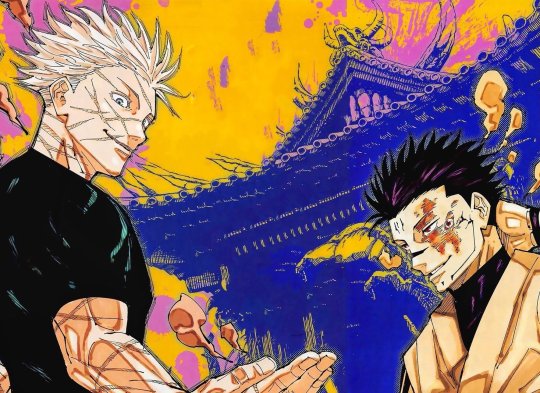
Gonna lose?! It’s Gojō Satoru!!
Karma and consequence in Jujutsu Kaisen
With the release of chapter 235 of Jujutsu Kaisen, the King of Curses has been defeated and Gojō Satoru has cemented his title as the 'Strongest’. The war isn’t over yet, but the battle is won, and I think the outcome of this fight is by far the most interesting for both characters.
Truthfully, at the start of the Shinjuku Showdown arc, I wasn’t particularly rooting for Gojō or Sukuna to win. However, as the fight developed (alongside the release of the anime adaptation of Hidden Inventory/Premature Death), I found myself becoming more and more invested in Gojō Satoru as a character and, consequently, theorising about what a ‘satisfying conclusion’ to his story might look like.
Shortly after the release of chapter 232, I saw an interesting post suggesting that ‘gain and loss’ is the theme of the Gojō vs Sukuna fight. Of course, ‘Gain and Loss’ is the title of chapter 221 when Gojō finally gets out of the Prison Realm only to learn that Sukuna has taken over Megumi’s body. I’d like to go a step further and suggest that ‘gain and loss’ — and by extension, karma and consequence — is actually a key theme of Gojō’s character (and maybe even Jujutsu Kaisen on the whole).
For full disclosure, I wrote about 90% of this before chapter 235 was released, operating on the belief that Gojō would eventually win this fight. It is a long post, so buckle up and let’s get into it!
Gain and loss in Jujutsu Kaisen
The idea of gain through loss was developed very early on in Jujutsu Kaisen with the introduction of binding vows. From Nanami’s ‘overtime’ to Sukuna's open barrier domain, a self-imposed binding vow offers a sorcerer an advantage in combat in return for an increased level of risk. In other words, sorcerers can ‘gain’ strength in exchange for a ‘loss’ of security. When it comes to binding vows, the bigger the risk the bigger the reward.
The idea of gain through loss was further developed through the introduction of Heavenly Restriction. Similar to a binding vow, a person with a Heavenly Restriction is ‘gifted’ with enhanced abilities in one area in exchange for limitations in another. However, unlike a binding vow, Heavenly Restriction exists from birth (although it remains unclear whether it occurs due to mere chance).
There are numerous powerful examples of both binding vows and Heavenly Restriction throughout the series. For Gege Akutami, they are key to maintaining a balanced power system where intelligence and tactical thinking can lead an underdog to prevail in the face of a more powerful opponent — think Yūta beating Getō or Toji beating Gojō. Through these mechanics, we can deduce that understanding gain and loss, give and take, risk and reward — however you want to put it — is crucial to mastery of jujutsu sorcery.
Naturally, if gain and loss are embedded in the laws of the Jujutsu Kaisen universe, it makes sense that the theme exerts a heavy influence over the narrative, too. Of course, consequences are an important way to create compelling characters in any story, but this rings especially true for Jujutsu Kaisen which draws deeply on Buddhist themes and traditions.
In Buddhism, karma is not a deterministic system of retribution, but the natural law of cause and effect. It is directly referenced in Jujutsu Kaisen when Fushiguro Megumi explains his personal ideology using ‘因果’, a Japanese Buddhist term meaning ‘karma’ or ‘fate’ which can be more literally translated as ‘cause and effect’. The second kanji means ‘fruit’, hinting at the underlying agricultural metaphor behind karma in Buddhism: plant a seed, later receive a harvest — or, to use a saying derived from another religion with an important role in Jujutsu Kaisen, ‘you reap what you sow’.
However, an important characteristic of karma which is commonly misunderstood is that the relationship between a cause and its effect is not necessarily linear, but rather part of an intricate network that spans past, present, and future. In other words, the ‘consequences’ of one’s actions might arrive much later.
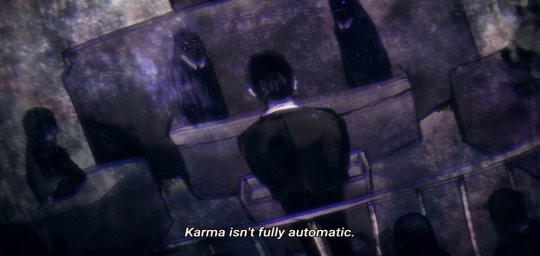
This can lead to mistaking the effect of one cause for the effect of another, creating a reality where ‘bad’ things happen to ‘good’ people and vice versa. The resulting circumstances may make it easier to do ‘bad’ deeds but, importantly, the freedom always remains to choose the path of ‘good’.
Thus emerges a system where liberation from suffering (in Buddhism, the endless cycle of rebirth known as samsara) is not determined by the judgement of some higher power, but by an individual’s continued choice to do ‘good’. In other words, you can create your own destiny, but only if you understand karma.
The beginningless karmic cycle is rooted in actions performed in ignorance. Therefore, breaking free of it — enlightenment — can only be achieved through knowledge.
Gojō Satoru: the embodiment of enlightenment
As a character, Gojō Satoru is symbolically tied to these concepts. We’re told that his birth altered the balance of the world, causing curses to grow stronger in response to the sudden injection of power into the ecosystem. However, while Gojō’s birth might be the cause of the imbalance, his very existence is itself the effect of something else.

Supposedly, the Star Plasma Vessel, the Six Eyes, and Tengen are all connected by fate. However, the term that Tengen uses — ‘因果’ — is the same one that Megumi uses for ‘karma’, suggesting a cause and effect relationship. This is confirmed when Tengen implies that the Star Plasma Vessel and the Six Eyes always appear in response to the merger — the irrepressible effect to the merger’s cause.
Kenjaku cannot contend with the immense strength of the Six Eyes nor the universal law of cause and effect. However, Fushiguro Toji, who possesses no cursed energy due to his Heavenly Restriction, is not bound by fate and is thus able to interrupt a cycle of cause and effect which has existed for at least a thousand years.
Tengen actually suggests that karma (因果) and cursed energy are one and the same so — if we take Tengen’s words at face value — Toji is an anomaly who is free from its bindings.*
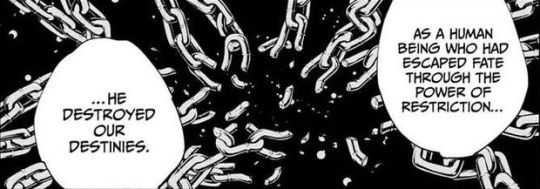
However, the characters whose lives he touches are not. Toji sets another chain of cause and effect into action when the events of Hidden Inventory lead to Gojō’s ascension to 'the Strongest'.
There is much debate in the fandom about whether Gojō’s moment of ‘enlightenment’ is legitimate, especially in light of his fight with Sukuna — the only other character associated with the phrase supposedly uttered by Buddha Shakyamuni at birth.
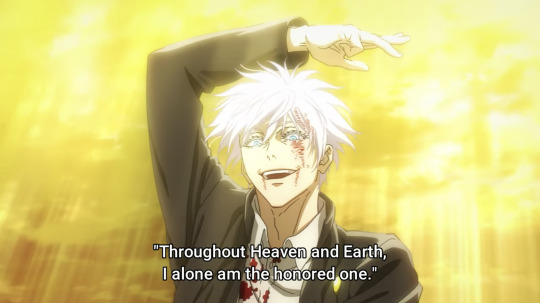
However, if enlightenment is understanding of reality that transcends conceptual thought, then Gojō Satoru is its physical embodiment in Jujutsu Kaisen.
His given name, Satoru (悟), is a verb meaning ‘to know’ or ‘to understand’, and the root of the Japanese Buddhist term for ‘enlightenment’. His innate domain — a representation of one’s innermost self — is a flood of infinite knowledge that constitutes the ‘truth’ of the universe. His Six Eyes are reminiscent of the all-seeing Eyes of Buddha or the Six Transcendental Powers or the Five Eyes — or perhaps all three!
Gojō is steeped in symbolism not only relating to Buddhist enlightenment, but to the founding Buddha himself, right down to his world-altering birth — the divine event which sets the modern-day story in motion.
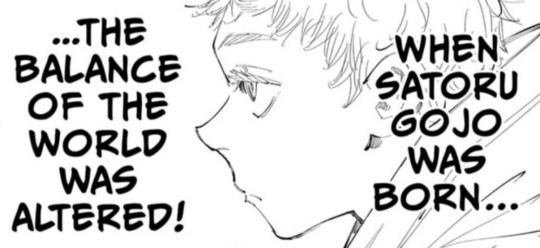
Although he may have spoken Buddha Shakyamuni’s words in a moment of euphoria, the suggestion Gojō had reached a higher state of being was never intended to be called into doubt. The pertinent question, instead, is why the unimaginable strength that accompanies his ascension to almost godlike status seems to bring Gojō more loss than gain — especially when, in a twist of irony, he was only able to gain that strength through loss.
‘The Strongest’ : an allegory for enlightenment
As the two strongest sorcerers battled it out in Shinjuku, the question on everyone’s lips during the weekly chapter discussions was, ‘Who will win?’ However, Jujutsu Kaisen has already established that ‘winner’ is not necessarily always interchangeable with ‘strongest’. Perhaps that’s why, in the aftermath of the fight, the discussion has turned to arguments about which character is the strongest instead — from cursed technique to battle IQ.
Even now, we don’t know much about Sukuna’s abilities nor his character, so it’s always been difficult to accurately judge his strength against Gojō’s. However, a surprising number of people went into this fight believing that Sukuna would win without much trouble.
Some made the reasonable argument that ‘the strongest sorcerer in history’ using the Ten Shadows technique while inhabiting the body of his dearest student presented a no-win situation for Gojō. Others made the much less reasonable argument that Gojō’s claims about his strength were little more than arrogance born from a cushy life in an era of ‘weak’ sorcerers.
Indeed, Sukuna himself echoes that sentiment in chapter 230, going as far as to call Gojō ‘unenlightened’ (凡夫) — before being immediately humbled.
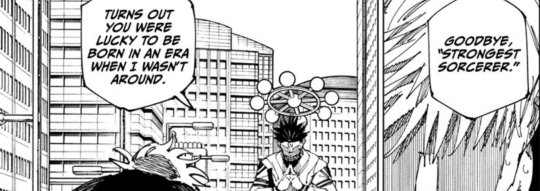
This isn’t the first time that Gege Akutami has directly challenged readers’ assumptions through his characters. However, Gojō in particular lends himself to reader speculation, because Akutami deliberately makes it difficult to know the character by maintaining a narrative distance from him that mirrors his Limitless technique.
This leads to a wonderful phenomenon where the reader falls into the same trap as the characters in the series by assuming that, while other sorcerers are struggling dreadfully, Gojō is having an easy time of things — because that’s what it looks like most of the time. Nanami might be right when he suggests that Gojō could take care of everything by himself. However, just because he could do it, does that mean he should?
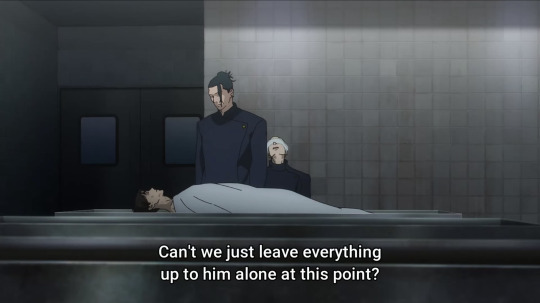
The problem is, with Gojō kept at a distance, it’s easy to forget how he became 'the Strongest’ in the first place. It’s true that, even before he becomes a fully realised Six Eyes user, Gojō’s abilities dwarfed those of any other living sorcerer. For people like Getō and Megumi whose techniques require a very steep learning curve to master, I can imagine that it feels like Gojō’s unimaginable strength was handed to him on a silver platter at times.
However, both things can be true: Gojō was born with innate strength that most sorcerers can only dream of and Gojō is an exceptional talent in his own right.
We all saw the suffering and sacrifice that Gojō went through on his path to becoming a sorcerer strong enough to face the King of Curses. In a series where the primary power source is born from negative emotions, perhaps it makes sense that tragedy promotes strength. Yet, Getō — whose technique is the epitome of strength through negative emotions — experienced the same tragedy as Gojō. So why did they head in opposite directions after the events of Hidden Inventory?
If Gojō is the embodiment of enlightenment in Jujutsu Kaisen, then Getō is his opposite. Where Gojō achieves understanding, Getō is blinded by ignorance which shackles him to a cycle of suffering — the marathon game of jujutsu sorcery.
In blaming non-sorcerers’ inability to regulate cursed energy — rather than the negative emotions that generate cursed energy in the first place — Getō mistakes one cause for another. Following the natural law of cause and effect that is karma, the solution should lie in shedding negative emotions altogether — just like Gojō at the moment of enlightenment.

Sadly, in his quest to find liberation from suffering, Getō actually condemns himself to it. Where Gojō chooses to let go of hatred and anger, Getō chooses to cling to them. This is ultimately why 'the Strongest’ changes from plural to singular. However, all of this assumes that Gojō did things the ‘right’ way when it’s very possible that Gege Akutami actually seeks to criticise a religious doctrine that separates the ‘honoured’ ones from everyone else.
Getō’s response to the horrors he endured evokes sympathy because it feels fundamentally human. In contrast, enlightenment seems so unattainable to the average human being that it becomes almost inhuman — the reserve of gods.
Indeed, Gojō is often accused of having a ‘god complex’, and Gege Akutami’s continued references to the divine don’t do anything to help. However, the series more often paints its strongest characters as closer to weapons of mass destruction or natural disasters, making the reality of ‘the Strongest’ less like reverence and more like dehumanisation.
Although Gojō achieved ‘enlightenment’, he’s ultimately still a human being — something that’s easy to forget. In fact, one of my favourite things about Gojō’s character is how he exists on an almost metatextual level. Too often, characters and readers view Gojō Satoru as 'the Strongest’ first and a human being second — a notion embodied by this notorious panel.
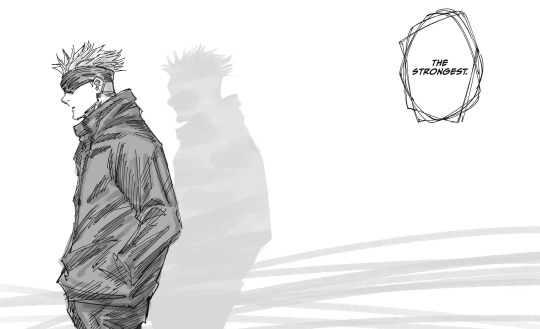
Thus, rather than having a ‘god complex’, I interpret Gojō as a character who struggles with his place in the world. His strength is what keeps him at a distance from the people around him — from the literal distance maintained by his technique to the metaphorical distance that separates him from the ‘unenlightened’.
Even the blindfold he wears to avoid discomfort hides his eyes, shutting off the ‘window to the soul’ and making him a less approachable figure. Thus, the thing that makes Gojō more comfortable around other human beings is ironically the thing that makes others less comfortable around him.
With the power at his disposal, Gojō is frightening at times, and Gege Akutami goes to great pains to show us the brutal potential of such strength — for example, in Shibuya when he ruthlessly dismantles 1000 transfigured humans with the precision of a machine in less than five minutes.
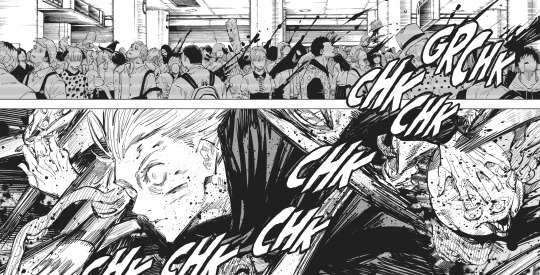
However, this display of violence comes off the back of Gojō’s most compassionate moment in which he bends the laws of jujutsu sorcery to preserve as many human lives as possible. Each time the curses attempt to force his hand, he does the inconceivable, even going so far as to limit his own strength by fighting without his technique to avoid collateral damage to humans caught up in the chaos.
Importantly, he doesn’t agonise over his decisions like the curses expect. Instead, when presented with a choice between two options that fundamentally violate his ideals, he forces another path without thinking. This is Gojō’s ‘overwhelming sense of self’. His commitment to upholding the ‘meaning’ he inherited from Getō is so unshakeable that it’s instinctive; so engrained that it’s unconscious.
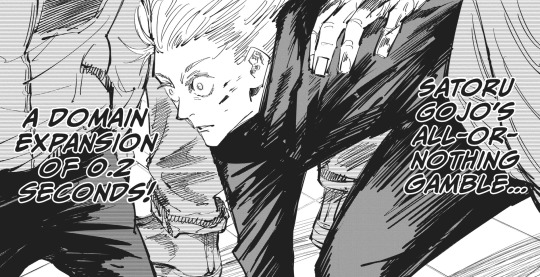
Despite his inhuman strength, Gojō’s actions in Shibuya exemplify his firm stance on the side of ordinary human beings. From his technique to his blindfold, he removes the physical barriers that separate him from the rest of humanity. The result is that, although his display of power in Shibuya is godlike, Gojō never seems more human.
Of course, it’s his humanity that ultimately makes him vulnerable to the Prison Realm, and many suggested that this ’weakness’ is why he would lose to Sukuna — a character who has wholly relinquished his humanity.
Humanity in opposition to strength
The unexpected appearance of his ‘best friend’ in Shibuya causes Gojō to falter for a heartbeat, but it’s long enough to make his brilliance look like foolishness in hindsight. His decision to save innocent people at B5F ultimately leads to the deaths of many thousands more over the course of October 31st and the following Culling Game. Among the casualties of the chaos are some of Gojō’s friends, colleagues, and students — as well as the Fushiguro siblings who were under Gojō’s personal care.
Of the Hidden Inventory arc, Nakamura Yūichi, Gojō’s voice actor said:
‘Even though Gojō had power, he failed his mission, he failed to protect Amanai, and he lost his best friend. He lost everything, and the only thing he succeeded at was awakening his abilities.’
So, it certainly seems true that Gojō’s choice to hold onto his humanity has brought him more losses than wins. In fact, at this point in the story, can we honestly say that Gojō has ever truly ‘won’?
Despite this, the characters in the series never stop thinking of Gojō as ‘the Strongest’. The narrative doesn’t ridicule him for his sentimentality in Shibuya, because it’s perfectly reasonable in the face of Kenjaku’s mind-boggling scheme. Even Sukuna recognises Gojō’s strength in the immediate aftermath of the event.
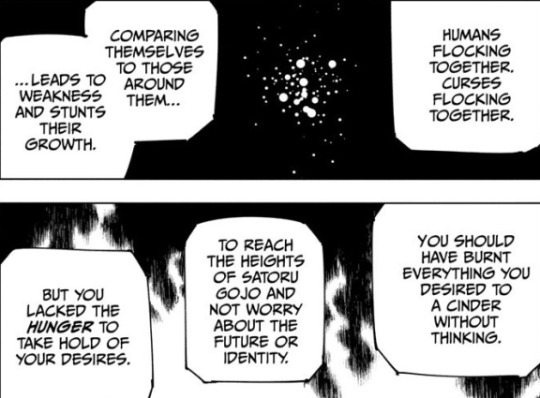
Aside from Kenjaku themselves — who has never suggested that Gojō is anything but immensely powerful — no one has ever criticised Gojō for his humanity. In fact, even prior to the Shinjuku Showdown arc, I’m not convinced that humanity is ever reliably situated in opposition to strength in Jujutsu Kaisen.
Many point to Uro Takako’s conversation with Okkotsu Yūta as evidence that tossing out one’s humanity is the only way to achieve ultimate strength. However, putting aside the fact that the translation warps Uro’s meaning somewhat, it’s unwise to assume that Sukuna’s is the only way to reach that level, simply because he’s the only example in history of a sorcerer with comparable strength to Gojō.
This is even more true when you take into consideration that everything about the context surrounding Uro’s assertion suggests otherwise. After all, this prideful, vicious sorcerer has just been beaten by a teenage boy who fights solely to protect the people he cares about.
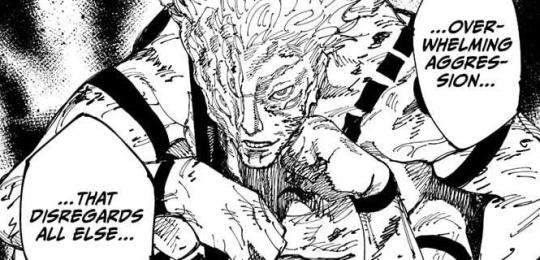
‘Overwhelming sense of self’ — the more accurate translation of the above panel — is about having absolute conviction in who you are as a person. The quality of your ideals is irrelevant as long as your commitment to them surpasses all else, and this has never been Gojō’s issue.
To say that Gojō’s humanity makes him weak misses the point, because it’s never been a question of strength. There’s no need to invent a weakness in the form of his humanity, because we already know his weakness — he told us himself.

Perhaps this starts to get at the the truth of ’the Strongest’ and the solitude that comes with ultimate strength. In Gojō’s own words, ‘When granted everything, you can't do anything.’ Despite being strong, he simply cannot save everyone. So, if being ‘the Strongest’ doesn’t help Gojō towards his goals, then what’s the point in his strength?
Of course, this is why Getō’s parting words hit Gojō so hard. When the boy who taught him that ‘protecting the weak’ is important tells Gojō that he has the power to commit the biggest act of genocide in history, the title of 'the Strongest’ is transformed from a blessing into a curse. I can’t imagine that Gojō ever feels more powerless than when he realises that he’s trying to save people using a body that’s built to destroy — a contradiction that’s illustrated to us in our first introduction (chronologically) to Gojō as a character.

If that wasn’t enough to cause an existential crisis for Gojō, Getō’s follow-up question guarantees it. In challenging Gojō’s assertion that Getō’s goals are impossible to achieve, Getō simultaneously questions Gojō’s identity beyond ‘the Strongest’, unintentionally (or perhaps intentionally) dehumanising Gojō by reducing him to his strength. This is especially painful coming from Getō of all people.
By the end of the conversation, Gojō’s entire worldview has been called into question by the person he trusted most. Getō, who always impressed upon Gojō the importance of meaning, leaves Gojō searching for the meaning in his strength — and, over 200 chapters after Getō asked the question, the answer still isn’t clear. This, I believe, is where the Shinjuku Showdown arc comes into play.
A reason to fight
From a narrative point of view, Getō isn’t entirely wrong to insinuate that Gojō lacks an identity beyond ‘the Strongest’. His primary role in the story has always been to act as a power ceiling from which the reader can extrapolate information about Gege Akutami’s world and its mechanics. Even his absence from the story is meticulously set up to illustrate the anarchy that breaks out due to the power vacuum he leaves behind.
Prior to the Shibuya Incident, Gojō Satoru’s overwhelming strength presented an obstacle to other characters’ growth. In order to create a more balanced playing field and an opportunity to explore creative techniques and fights on a previously unseen scale, it’s understandable that Akutami needed to get Gojō out of the way — at least until Sukuna could join the story as a fixed member of the cast.
As expected, even the strongest sorcerers we encountered during the Culling Game pale in comparison to the prowess on display during the Shinjuku Showdown. It all serves to show that Gojō and Sukuna are on an entirely different level — to the point that, even after Gojō burns out the part of his brain responsible for his domain, his strength still doesn’t dip below that of Okkotsu Yūta and Hakari Kinji.

To paraphrase Megumi, I shouldn’t try to find logic in a powerscaler’s behavioural patterns, but I can’t deny it’s immensely frustrating that week after week fans get caught up in arguments about who is the better sorcerer when it’s the least interesting thing about this fight.
The only reason ’the Strongest’ even existed as a neatly defined category up until this point was because of the lack of any viable opponent for Gojō. Now that he’s fighting someone on his level, comparing these two behemoths of jujutsu sorcery is the same as any other powerscaling exercise: reductive, vulnerable to bias, and ultimately missing the point.
Gege Akutami has never written a fight simply for the fun of seeing two characters go at it. There’s been a greater purpose behind every carefully created match-up in the series, either in the form of high stakes or an important lesson for the characters involved — or sometimes both.
While Akutami clearly enjoyed writing this back and forth between two masters of their craft, carefully balancing the scales to ensure that neither gained the upper-hand for too long, there is a great deal of character development staked on the outcome of this fight.
There are parallels between Gojō and Sukuna as characters but, more than anything, the Shinjuku Showdown arc has exposed some fundamental differences between the two — namely, why they fight in the first place. While it’s true that Gojō is fighting Sukuna partly because there’s no one else who can, it’s also true that the stakes have never been higher for Gojō. He has a lot to gain and a whole lot more to lose, so his reason for fighting feels tangible to the reader.
Conversely, Sukuna’s reason for fighting is considerably less clear. While we don’t know the nature of Sukuna’s binding vow with Kenjaku — or anything about his motivations in general — it doesn’t seem like there’s much at stake for Sukuna except for, perhaps, his pride. Beyond advancing the plot, this poses a lot of interesting questions about what Sukuna would have to gain from winning this fight.
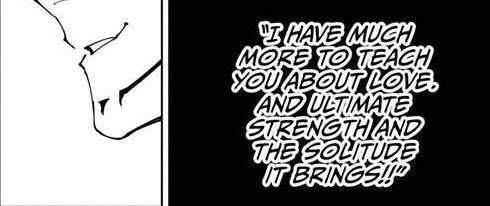
Since Gojō’s return, Sukuna has recalled Yorozu’s words about love multiple times. Their purpose — and Sukuna’s initial reaction to them — are still shrouded in mystery. However, through Gojō, we can learn something about ‘love’ and how it relates to the ‘the solitude of ultimate strength’.
Gojō never wanted to be ‘the Strongest’ alone. In fact, his entire motivation as a character is raising up ‘strong and intelligent allies’, constantly chasing the companionship he felt as one half of the strongest duo and trying to ensure that his students never feel the same isolation that’s plagued him and Getō before him.
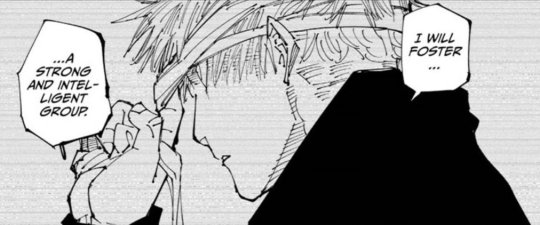
In the recent chapters of the manga, Gege Akutami has made it clear that Gojō isn’t really alone at all — Shōko reminiscing on their friendship in chapter 220; Gojō’s comrades rallying around him during the send off in chapter 222; the wonderful ‘my students are watching’ callback in chapter 230.
What’s more, for the first time in his adult life, we see Gojō — who’s famously in his element when he’s alone — start a fight with people at his side, leaning on three characters who we’ve previously been led to believe he looked down on.
The distance that’s always existed between Gojō and the people around him is closing. He has removed his mask and he is open to the world — the blindfold is gone; the shapeless, oversized jacket is gone; Gojō even removes his technique to let people in during his sendoff. Akutami makes it explicitly clear that Gojō’s allies have got his back, and he’s got theirs in turn — they’re his reason for fighting.

On the other hand, his opponent only has a single ally in all the world and, although Uraume is a devoted servant, there is no suggestion that they would tag in when the going gets tough. Sukuna has already told us that, for him, losing and dying are the same thing — a curious contrast to Gojō who does not put ‘winning’ and ‘dying’ in opposition, and this creates an interesting situation where both fighters could ‘win’ by their standards.
If Gojō saves the people he cares about (and the world at large) but dies in the process, he wins. Equally, if Sukuna is the sole survivor of the fight, he wins — but what would that actually mean for him?
One approach embodies overwhelming selfishness, the other embodies overwhelming selflessness, but only one of these approaches has been established as the most powerful form of binding vow in Jujutsu Kaisen. With all that said, many people believed that Gojō dying to win was the most likely conclusion to the fight — but that’s what a small fry would think!
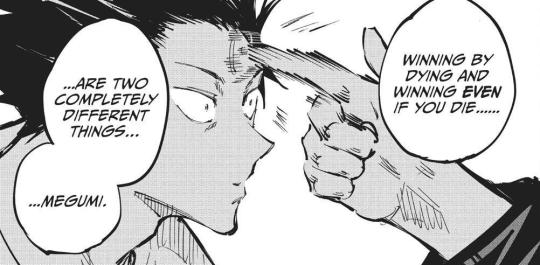
In Jujutsu Kaisen, it has always come down to one question: how much are you willing to risk — not sacrifice — in order to win? This is the lesson that Gojō impresses upon Megumi, and it’s why I was always in the camp that believed Gojō would win and survive. I didn’t expect his victory to be quite so clear cut, but it seems obvious in hindsight — and it’s all thanks to the power of love and friendship.
In chapter 234, Kusakabe suggests that Sukuna is keeping something in reserve, because he knows that if Gojō loses, he’ll immediately have to fight a number of other powerful sorcerers. Gojō knows that there are strong allies ready to back him up if he fails, so he can go all out.
Meanwhile, Sukuna is truly alone — to the point that he has to create allies in the form of shikigami in order to contend with Gojō. In the end, the explanation for Gojō’s victory is simple. Where Gojō gave it his best, Sukuna didn’t — and that was a grave underestimation of his opponent for which he paid the price.
So, the Shinjuku Showdown arc has come to an end and Gojō has reaffirmed that he is, in fact, 'the Strongest'. However, his story isn’t over yet, so what would a satisfying conclusion to his character arc look like?
Are you Gojō Satoru because you’re the Strongest?
Although Itadori Yūji is the main character of the series, Gojō Satoru is foundational to the story — despite how much Gege Akutami jokes about hating him. Gojō’s story is the thread that ties the series together, so landing the ending is crucial for completing not only Gojō’s character arc, but also that of many other characters. For Gojō, everything consistently comes back to Getō Suguru and Fushiguro Toji, but there remain unanswered questions regarding both.
Toji’s presence during the clash of the strongest sorcerers is too large to ignore. Aside from the allusions to Toji himself, his son plays a pivotal role in Gojō’s story as the human representation of gain through loss — the blessing born from Gojō’s curse. Taking Megumi under his wing marked Gojō’s first step towards a brighter future after the tragedy brought on by the failed Star Plasma Vessel mission, but there’s one major plot thread left unresolved.
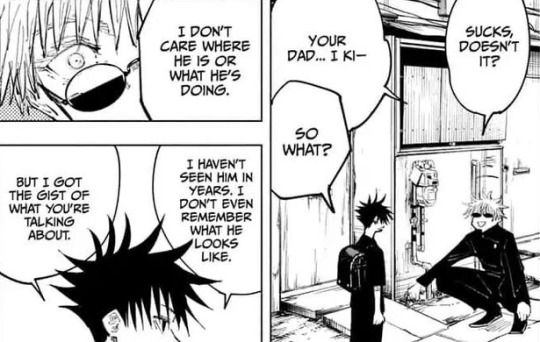
I wouldn’t have thought that Megumi learning the truth about his father was important after he dismisses Gojō’s attempt to tell him during the Hidden Inventory arc. However, the combination of Megumi’s interaction with Toji in Shibuya, his visible cluelessness when Tengen mentions Toji, and the numerous ways Gojō references Toji during the Shinjuku Showdown arc has convinced me that Akutami plans to follow this up at some point.
Right now, Megumi’s fate is still hanging in the balance. Although many people are waiting for something terrible to befall Gojō — losing his Six Eyes; burning out his technique permanently; dying — I’d like to believe that, if we look at Jujutsu Kaisen through a karmic lens, Gojō isn’t owed any more losses. At the very least, he certainly doesn’t have to die to progress the story as some people have suggested.
Our heroes, including Gojō himself, have been on a major losing streak for a long time now. Gojō being freed from the Prison Realm represented a shining beacon of hope at the lowest point in the series. To extinguish that light by killing Gojō almost immediately after he’s returned to the story would be another major blow to the characters and the readers.
I wouldn’t put it past Akutami to send some more pain our way before the end of the story, but if Gojō is going to die on December 24, I don’t think it’s before a number of other things happen.
If Gojō inherited Getō’s ideals in a symbolic ‘passing of the torch’, then his death before he has confirmed the safety of the people who depend on him is a depressing end to his best friend’s legacy. Additionally, up until now, Gojō has never had the opportunity to answer Getō’s question once and for all.
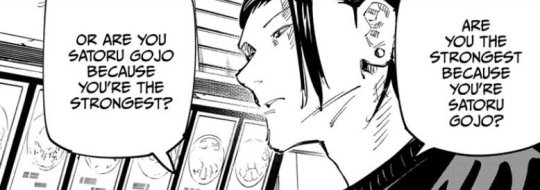
I would argue that Gojō has proven multiple times during the fight against Sukuna that he’s 'the Strongest' because he’s Gojō Satoru, but is he Gojō Satoru because he’s the strongest? He can’t discover that unless he experiences what it’s like not to be 'the Strongest' — either by losing his strength or by sharing the burden with the strong and intelligent allies he’s been raising for the entirety of his adult life.
Of course, there’s one more glaring thread to tie up, and it might be the most important of all when it comes to the completion of Gojō’s character arc. His first thought when he bursts out of the Prison Realm is a desire to lay Getō’s body to rest — a desire to rectify the mistake which threw the entire world into chaos.
As we’ve already discussed, despite his strength, Gojō has racked up a collection of costly failures. Thus, his entire character arc is about learning from the mistakes of his past. He’s taken every cruel loss that the universe has sent his way and, instead of lashing out with all that power at his disposal, he has grown from his experiences and chosen the path of ‘good’ time and time again.
If Gojō dies before retrieving Getō’s body from Kenjaku’s clutches, he has failed his best friend at the very last hurdle, and this would be a truly bleak way to end his story.
Concluding thoughts
At the conclusion of the Shinjuku Showdown arc, I’d like to see Gojō Satoru step back from the fight after inspiring hope in his students by delivering a final lesson in the form of his win. It is impossible to predict what Gege Akutami will do next, but I would like to see the reins handed back to the students for a while, as I feel Gojō has played his part against the King of Curses.
It is Sukuna, not Gojō, who presents the most interesting possibilities for character development after the conclusion of this fight. I am genuinely excited to see how he grapples with this loss that has the potential to challenge his entire view of himself and others. He disrespected Yorozu and treated his fight against her as a ‘test drive’, and thought he could get away with treating Gojō the same way. I think Ryōmen Sukuna might be about to learn some important lessons, and I would love to see him in conversation with Gojō before the latter bows out of the story.
Of course, we can always trust Gege Akutami to surprise us, and it’s entirely possible that the story will veer in a completely different direction than I expected. However, I have faith that he will deliver something profound, no matter what lies ahead.
---
*This is a very interesting concept in and of itself, especially in relation to the goal of the Culling Game, Yuki and Kenjaku’s battle of ideals (i.e. ‘breaking free from’ versus ‘optimising’ cursed energy), Maki’s ‘enlightenment’ in the Sakurajima colony, and the understanding that true enlightenment lies in breaking free from all karma — both good and bad. After all, golden shackles are still shackles. Perhaps I’ll write about this another time.
#jujutsu kaisen#jjk#jjk 235#呪術廻戦#jjk meta#jjk analysis#jujutsu kaisen meta#jujutsu kaisen analysis#jjk spoilers#jjk manga spoilers#jujutsu kaisen spoilers#gojo satoru#sukuna#ryomen sukuna#fushiguro toji#fushiguro megumi#geto suguru#kenjaku#glo's writing#glo's analysis#fushiglow#can you see why this took so long???#it's almost 6000 words 💀#and maybe it's all bullshit haha!!#but i'll hate myself if i wasted all that time for nothing#so enjoy i guess!!
220 notes
·
View notes
Text
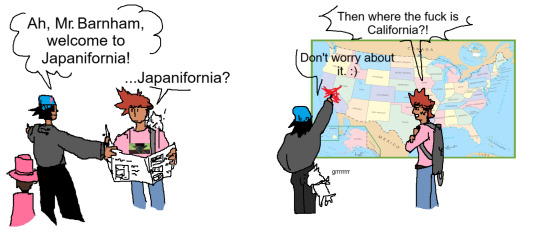


zacharias barnham visits the wrights
#eat your burger zacharias#inspired by the iconic eat your burgers apollo comic#phoenix KNOWS what he's doing. he's such a little shit#back on my bullshit of putting this guy in situations#i like to imagine that trucy and zach bond over stage performances (since yknow. zach was technically an actor. a thespian if you will)#and also trucy could teach him some innocent magic tricks that don't kill anybody (don't tell him about the whole gramarye deal)#i am /half joking of course#my reasoning is: if plvspw happens after AA 3-5 then while zach is figuring out his new life in and traveling phoenix is getting disbarred#why is “gramarye” so hard for me to write. i always write “grammayre” like huh?#my art#ms paint#ace attorney#plvspw
61 notes
·
View notes
Text
You Don't Need A Licence For That
Yet another Ineffable Meet-Cute fic, in which Crowley works for the local council and is grumpy and mean to everyone, but Aziraphale. Who seems to be hoarding licences and permits (I told you guys I would write it! Eventually...)
First chapter coming to you this Saturday! But until then, here is a little sneak peek,
"I thought you were opening a book shop?" Crowley asked, voice scratchier than it should have been when discussing paperwork.
Aziraphale, at least, seemed grateful for the change of topic. And decided to approach the new one with what Crowley was starting to suspect was his normal level of enthusiasm.
"I am, yes! It is going extremely well. We are to open in a few weeks time, in fact! Something I doubt we would have been able to do if not for the miracle you worked with the business licence. I previously heard it takes months to get it. I was talking to Nina. From across the road, you see, she runs this gorgeous coffee shop, and she said that the people working here were- Oh, never you mind what she said. She was very clearly wrong."
How utterly. Adorable.
Crowley had never used that word so many times in his life. And yet, it still remained the most appropriate one.
"You don't need a premises licence for a bookshop," he reminded the other man, waving the form in front of his face. He would have thought it was a mistake, but the form was, once again, filled out perfectly. There was no way someone completed an extensive operating schedule without realising what they were doing.
Aziraphale raised a finger. Somehow, it just added to the cuteness.
"Ah, that is where you are wrong, my dear fellow. What if people were to get peckish? I would be a terrible host if I could not offer them tea and biscuits."
#yes i am very much back on my bullshit#why do you ask?#weirdly enough#its crowley that's the oblivious in this one#tartziraphale#my beloved makes an appearance#wip wednesday#good omens#good omens au#ineffable husbands#ineffable humans#gomens#aziracrow#aziraphale x crowley#crowley x aziraphale#good omens fanfiction#good omens human au#ineffable idiots#the ineffable meet-cute#my writing
27 notes
·
View notes
Text
Catra being anxious and having panic attacks over the bad things she did is actually counter productive to any hypothetical scenario where she is self reflecting and/or receiving constructive criticism.
Her potentially having crippling anxiety over being an asshole in the past PREVENTS and/or DELAYS any changes she might potentially make.
Making this character spiral over moral dilemmas does not inherently mean she’s actively working to change her ways. Her being afraid of facing her badness does not make her good; it simply means she has anxieties toward constructive criticism/dialogue.
#in response to the dumb fuck fan comics I see about Catra having panic attacks over and over#yeah like. I get th sentiment. but really that’s not how that works#well. it DOES. but if the audience of the popular fanon POV of Catra’s character is supposed to be sympathetic#why make her a wet soggy cat (metaphorically)#why make her the sad pitiful one#if she’s making changes in her life and her behavior… wouldn’t that be… impowering ?#wouldn’t she feel happier?#she wouldn’t even need to be coddled by Adora (and company).#she’d accept the bad things she’s done and would apologize with no tears none of this wet cat bullshit attitude#actually… fuck it I’ll just write something where she does exactly that#mariposa rants#what I told you guys… that making a huge self pity party for yourself… after doing some shitty thing#is actually incredibly selfish … and silly….#(ex. bojack horseman. like. literally the entire show.)#eww mariposa ranting about bojack horseman#<<< (new tag cause I’m not down with this point)#basically. feel bad for a minute. then spend the next hour working on yourself. journaling. self therapy. actual therapy. meditate. pray.#whatever the fuck dude
83 notes
·
View notes
Text
There's a deep irony in Berserk being so admired by people who really really hate what Berserk is about on an emotional level, but especially when writers want to take influence from it. Because Berserk is very strong thematically, and someone who can't acknowledge subtext is going to whiff on emulating anything good.
#And by that I mean that like many of its influences and descendants the plot is fundamentally driven by toxic gay shit lol#Listen there's just no beating around the bush here: you either understand this type of story is super emotional#That the softness and hope and love for humanity is vital connective tissue between the edgy violent dark setting#And that at its core the queerness is *central*#Or you will just end up creating something toothless and cynical with tokenizing bullshit at best#You cannot make that lightning strike twice if you're too scared to even write that shit as ACTUALLY core to the plot#You don’t have to make your shit gay to be good you just have to understand if your major influence was gay and why#So that you respect subtext and thematic writing and emotional resonance in writing in general#And maybe understand that if you also want credit for pushing the envelope you get where the real standard is#This is one of those things I see in equal measure in dudebro homophobes and supposedly progressive queers#No that wasn't “bait/delusion” it was barely subtext and if you go into writing with that attitude you're going to write shallow shit lol#I genuinely believe when people lament about reading comprehension they're actually talking about willful ignorance#Because willfull ignorance *does* cause a need to deny reality to a point where it warps your ability to understand information#Having difficulty comprehending text from a learning disability or improper teaching#Has fucking nothing on someone whose deliberately trained themselves to rationalize away anything uncomfortable#Tag rant over but this shit really is a plague and you can see it so starkly when it comes to Berserk#An undeniably respectable work from a place many envious little goblins that covet it do not actually respect
27 notes
·
View notes
Note
how much of your writing is ai generated
ngl anon kind of fucking rude to come here and accuse me of that. i don’t make fic just to rack up some arbitrary numbers, be that wordcount or idk, kudos. i make fic because i fucking care about what i’m writing about. if i didn’t, i wouldn’t write it, i certainly wouldn’t post it. AI fic is a plague on fandom for plagiarism reasons, obviously, but also because why should anyone give a shit about your writing if you didn’t? I don’t care if one day we have AI that makes stuff identical in quality to what people can, or better, even, because the words on the page aren’t the point, it’s always about the reason behind putting them down.
So, to answer your question, none of it. And it never will be. I’d rather never write again than stoop to that. And I certainly think less of anyone who does it themselves.
#ask#why would anyone want to read an AI generated fic. just to have more content to consume?#it will never matter it will never say anything because a writing AI has no opinions has no beliefs has no feelings#at most it has biases inherited from the dataset.#an AI can’t explain the choices in a scene to you. or why it picked one word over another. it can spew a bullshit answer if prompted but#that’s not why it made it. it made it because it was algorithmically generating words.#i make shit because it matters to me. the craft is as important as the final product.#if i was reading a fic and the person dumped on me st the last minute that they’d used AI to make it i’d block them. immediately.
22 notes
·
View notes
Text
all i can imagine right now is teenage theo’s stupid gay ass listening to the 2004 re-release of mr. brightside by the killers (because, yknow, vegas) on repeat while bitching about kotku in his stupider gayer journal and then having an internal crisis wondering why mr. brightside speaks to him so viscerally
#yeah i'm still on them. probably has to do with the fact that i'm currently writing some fics for them shhhhhhhhhhh#fun fact i heard mr. brightside multiple times at clubs (yes clubs) without knowing the lyrics until recently#when my friends were singing it at karaoke and i was sitting there like. THATS what this fucking meme song is about???#idk why i just never read the lyrics because i usually do when it comes to music but ig i didn’t care enough#anyway it’s a song about gay pining. i decided. and theo decker listened to it and punched a pillow or something#is this headcanon now in the fic i'm working on right now? you better believe it. i'm ridiculous at heart#the goldfinch#boreo#eve text#eve's great tgf rehyperfixation#< please block that tag if you are sick and tired of my bullshit
36 notes
·
View notes